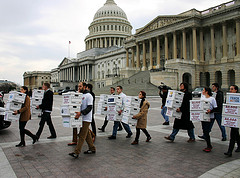On Tuesday, February 14, over 30 environmental and progressive groups delivered over 800,000 signatures petitioning the Senate leadership not to resurrect the Keystone XL tar sands pipeline.
They easily surpassed their goal to get 500,000 signatures in 24 hours – they achieved that in just 7 hours.
Here they are delivering the petitions to the Senate:

It looks like this enormous outcry is having some effect – the White House has threatened to veto the House Transportation Bill, which also includes a tar sands pipeline amendment.
The administration specifically pointed to the provision that would approve the Keystone XL pipeline as a reason for the veto, and said:
"This bill seeks to circumvent a longstanding process for determining whether cross-border pipelines are in the national interest by mandating the permitting of the Keystone XL pipeline project despite the fact that the pipeline route has yet to be identified and there is no complete assessment of its potential impacts, including impacts on health and safety, the economy, foreign policy, energy security, and the environment."
"The Administration has serious concerns with provisions in the bill that would make America’s roads, rails, and transit systems less safe, reduce the transportation options available to America’s traveling public, short circuit local decision-making, and turn back the clock on environmental and labor protections," the White House said in a formal statement of administration policy.
"And it fails to make the investments needed to strengthen the nation’s roads, bridges, rail, and transit systems."
The White House also took issue with funding the bill by expanding offshore oil-and-gas leasing and opening Alaska’s Arctic National Wildlife Refuge to drilling.
"The bill includes pay-fors that open up pristine natural habitats not suitable for resource extraction and undermine prudent development of the Nation’s oil and natural gas resources," said the White House.
The Congressional Budget Office (CBO) concluded the GOP’s reliance on oil drilling to fund the bill would leave funding $78 billion short and Democrats are against paying for infrastructure improvements through oil drilling, and say the bill shortchanges safety.
Conservatives say the bill costs too much and more centrist Republicans oppose its mass transit cuts.
